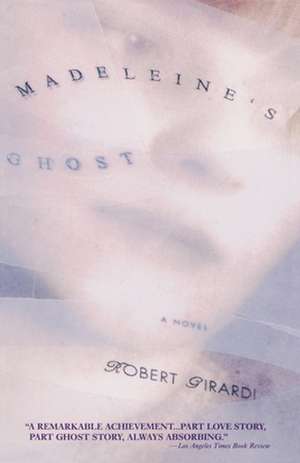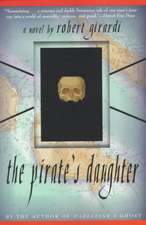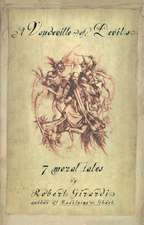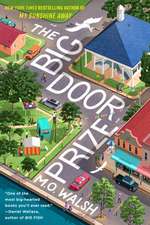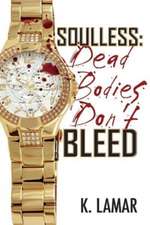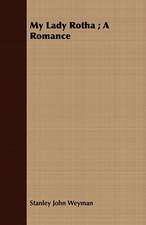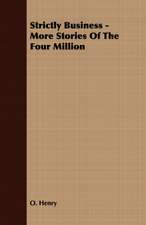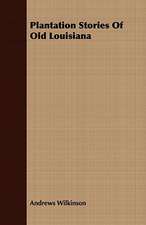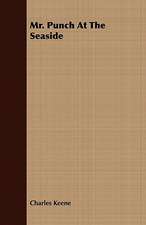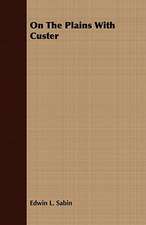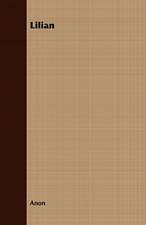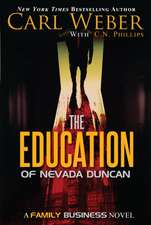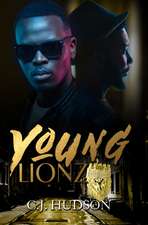Madeleine's Ghost
Autor Robert Girardien Limba Engleză Paperback – 31 mai 1996
But Ned is about to heed another call, the siren song of New Orleans, where the history of countless lost souls seems to rise from the steaming streets—and where, ten years before, he ended a brief, passionate affair with a woman whose memory has haunted him ever since. Here, in a city of spirits, Ned will embrace a dead saint and a living sinner...as a beautiful ghost offers him her desire. And his destiny....
Set amid the sleepless energy and seething passion of New York and New Orleans, Madeleine's Ghost is a spellbinding novel of lost love, history, and desire—a work of startling originality that is at once exquisitely written and compulsively readable.
Preț: 117.78 lei
Nou
Puncte Express: 177
Preț estimativ în valută:
22.54€ • 23.53$ • 18.61£
22.54€ • 23.53$ • 18.61£
Carte disponibilă
Livrare economică 25 martie-08 aprilie
Preluare comenzi: 021 569.72.76
Specificații
ISBN-13: 9780385316361
ISBN-10: 0385316364
Pagini: 372
Dimensiuni: 134 x 224 x 23 mm
Greutate: 0.48 kg
Editura: DELTA
ISBN-10: 0385316364
Pagini: 372
Dimensiuni: 134 x 224 x 23 mm
Greutate: 0.48 kg
Editura: DELTA
Notă biografică
Robert Girardi was educated at Catholic schools in Europe and at the University of Virginia in Charlottesville. He holds an MFA from the University of Iowa Writers' Workshop and was a recipient of the James Michener Fellowship in 1989. He lives in Washington, D.C. This is his first novel.
Extras
Stones are falling from the ceiling of my apartment. First one, then two, then dozens. I take refuge beneath the kitchen table as they bounce and dance across every surface, denting the toaster, gouging into the old linoleum of the floor. The falling stones are like a rain of hail, but so absurd in this setting that I want to laugh.
The first stone hit five minutes ago with a solid thump on the arm of the orange Naugahyde easy chair in the living room, then rolled into my lap. It was egg-shaped and smooth and wet, as if it had just been dredged up from the bottom of the river. A second hit the television and fell behind the gas heater in the fireplace. I counted five more like warning drumbeats; then I ran for the table. Now they bounce and roll all over, making quite a racket. They don't seem to come from anywhere. There are no holes in the ceiling. The stones flash into air just below the tin egg-and-anchor molding and fall as if they are falling from a great height.
The whole manifestation lasts about ten minutes. I wait fifteen minutes more before emerging carefully into the daylight from beneath the table. The smooth stones lie in piles in the kitchen, in the living room across the rug, on the couch, and on the television set, which appears undamaged. There are no stones in the bathroom or in my bedroom, but I find the largest pile heaped up on the bare floor in Molesworth's old room when I push open the door.
I take about an hour and a half to remove all the stones to the garden. The job requires five trips with a full suitcase, which I empty in the corner of the yard under the dry-rotted grape trellis. There is quite a little mound out here now, enough to pave a short walkway. I kick at it in frustration before I go back upstairs to collapse on the couch.
This is the second time in the last three weeks.
It is about two in the afternoon, Tuesday, mid-June, with the sun hot on my back and the sky seared and brown-looking above the island. The collar of my shirt is soaked with sweat.Just a block away the Manhattan Bridge creaks ominously in the heat, its abutments age blackened and massive as the pyramids. I am wearing an unseasonable tweed jacket, swamp green corduroy pants, a heavy powder blue oxford cloth button-down, and a regimental stripe tie -- the only presentable outfit in my closet. I am shaved and sober and calling on Father Rose in the rectory of St. Basil's Cathedral on Jay Street in Brooklyn.
A flat-faced woman in thick spectacles answers the door cautiously, pressing her nose against the barred peephole like a deep-sea diver in an old-fashioned brass helmet peering out at the ocean floor.
"I'm here to see the priest," I say.
"Father isn't seeing anyone right now. He's busy," she says,and goes to shut the peephole.
"Wait, I have an appointment."
"Step back," she says.
I step back, and a moment of silence follows in which the woman scowls and looks me up and down. I get the feeling she doesn't care for the striped tie. It's hardly the welcome one expects at the front door of a church, but I don't blame her. This neighborhood is bad, loomed over by the same projects to the east that threaten my derelict neighborhood just to the south.
At last she nods, slides the bolts, and opens the door. A dismal smell pervades such places, rectories and army barracks, places reserved exclusively for the use of men: ammonia and boiled cabbage dinners and long, terrible Sunday evenings without the sound of a woman's voice.
We go into a narrow hallway and up some stairs lined with dark paneling and hung with faded nineteenth-century prints of saints and Jesus praying in the Garden at Gethsemane, apostles sleeping the sleep of the craven behind Him in the weeds, and enter a small waiting room set with two rows of old pews and a few rump-sprung easy chairs. On an end table there are yellow copies of Catholic Digest and Highlights for Children magazine. I settle down to wait with the adventures of Goofus and Gallant in the latter as the woman goes to warn the priest.
Father Rose is lining up a putt when I am ushered into his chambers a few minutes later. He is hunched over the putter at one end of a mock putting green of AstroTurf, the hole opposing him an odd contraption that resembles a large aluminum daisy.
"Father Rose?" I say. "I'm Ned Conti, I called
yesterday . . ."
This is not the moment to speak. The priest, hardly awareof my presence, follows through with the putt. The ball goes awry,hooks to the left, and rolls under a chair. He gives a small strangled sound, and his shoulders slump. Waiting for him to recover, I glance around the room. It is bright and cheery, free from the religious gloom that pervades the rest of the rectory. Golf trophies stand dustless in glass-fronted shelves to one side. Autographed photos of Jack Nicklaus and Arnold Palmer flankthe abstract sixties-era crucifix hanging beside a window overlooking the handball courts in the asphalt park across the street.
"Putting is a gift from God," the priest says wearily, wiping the head of his putter with a handkerchief. He is a lean fellow, with a long face, and resembles a sort of amiable Charlton Heston. "It's like grace. The one thing in golf you can't really practice. You've got to have the knack, that's all."
He points the putter to a floral-print love seat against the wall. I sit, and he sinks back against the edge of his desk withthe easy grace of a man who has spent his life on the links. His face is tanned; his wrists are specked with freckles. He crosses his legs, and I can see he's wearing expensive two-tone golf shoes,cleats unscrewed, though his black cassock is threadbare and traditional, pulled in with a simple square-buckled brown beltafter the manner of the Jesuit Brothers at Loyola, who enjoyed the austerity of their priestly robes to the point of vanity. After all, there is nothing classier than basic black.
"Now, what can I do for you, Mr. Conti?" Father Rose says when we are settled.
"I came about your advertisement in the U.S. Catholic Historian," I say. "Historical research. That's my field. I'm a research historian. Have you gotten many responses?"
Father Rose frowns at his putter. "Are you a golfing man?"
I confess that I am not.
"I'm crazy about the game." He gestures at the trophy cases. "Maybe too crazy."
He pushes off the desk suddenly and strides back and forth across the room, putter held behind his back in one hand in a posture that I recognize immediately as characteristic.
"Last year," he says, "with the permission of the bishop, Itook a few months off to join the PGA tour. I was quite the golfstar in college, you know, but in our family it was traditional for the youngest son to join the priesthood. First time back incompetition in something like twenty-five years, and I made thecuts. All in all, for an old guy, I didn't do too badly, perhaps because I was careful to dedicate each ball to a different saint. After expenses, I came out of it with a net profit of five thousand seven hundred dollars. I have set aside these winnings for a special research project."
"Oh, yes," I say, trying to sound like I really don't need themoney. "What sort of project?"
"It is of grave spiritual significance to the future of Brooklyn. This is all I will say for now."
We go down into the churchyard to walk in the heat among the graves. Father Rose examines my credentials for a few minutes in silence, putter under his arm, lips pursed in concentration, a posture that befits a man with weighty matters to consider.
"B.A., Loyola University of the South," he reads aloud from my curriculum vitae to the mortuary heat of the afternoon. "New Orleans is a little wild, they say. I hear the Jesuits have a pretty good time down there."
I shrug, noncommittal.
"Do you know that city well?" He looks over at me, shielding his eyes against the sun.
"It's been a long time," I say. "But I think I could still get around."
"I don't mind telling you that certain aspects of my project touch on New Orleans. A knowledge of the place might be useful."
"Then I'm your man," I say. "It's fate."
He ignores this and goes back to my resume. "Catholic grammar school, Catholic high school . . . and now Ph.D. candidate in French history, Georgetown University. Well, an excellent Catholic education, Mr. Conti." He folds my CV into a pouch in his cassock. "You must be a man of sound convictions."
"I try, Father," I say, and give him the toothy smile of a used-car dealer. Actually my education is more a testament to my parents' faith than my own. I hated Catholic school. The nuns pulled on my hair and beat me with rulers. My mom forced me to go through the twelfth grade; Catholic scholarships paid for the rest.
"And how's your doctoral thesis coming along?"
"It's almost finished," I lie. "Another month, and I send it off to the committee."
The truth is, I started out right but got lost somewhere along the way. I haven't touched my thesis in nine months: Shakos and Epaulets-- Military Fashions and Ideas in the First Empire. The grand title conceals a scratched over ream of half-baked theories and poor scholarship concerning the effect of fancy uniforms on the development of imperialist attitudes in Napoleon's France. It is strewn in a messy heap of footnotes, coffee stains, crumbs, and roaches across the kitchen table in my apartment. Each night I keep meaning to begin again, and each night I find some reason not to.
First it was the disruptive presence of my ex-roommate, Molesworth, a loud, obnoxious bayou-trash Louisianan with filthy habits and a beer gut the size of Lake Pontchartrain. Now I blame the series of strange disturbances which have manifested themselves in the apartment in his absence and which I can only ascribe to the actions of a poltergeist. I am a rational man, but how else to explain stones from the ceiling and other weirdnesses? It is impossible to concentrate on my work in the middle of a haunting. This is the only word I have for the horrible, oppressive feeling that has invaded my rooms. I was allowed six years to complete my thesis and defend it before the advisory committee at Georgetown. Time is running out; barely six months remain. Perhaps if the ghost would go away?
I consider mentioning the haunting to Father Rose. He might be able to do something, arrange an exorcism, if they still perform exorcisms. But I reject the idea. Undoubtedly it is bad form to discuss ghosts at a job interview.
We follow an uneven flagstone path between the graves and dead end at an elaborate monument topped with an obelisk of black marble that seems out of keeping with the humbler headstones surrounding it. I notice a worn inscription in French cut on the base before we turn back again. At last we sit on a flat grave marker by the gate, and Father Rose swats at the weeds growing up between the stones with his putter. The wall bordering Tillary is topped with broken glass and tangled razor wire. A plane booms overhead in the hot sky, lowering toward Kennedy.
"Every night from the windows of the rectory I hear gunshots," he says at last, weariness in his voice. "Last year two young black boys no older than twelve years old shot it out on the steps of the church with machine guns, just like in a gangster movie. One of them died in my arms. You can still see the bloodstains on the white marble. Then the young girls come over from the Decateur Projects bringing babies for baptism who have no fathers and no names. 'Are you Catholic?' I ask. They are not Catholic; they do not know a single prayer and have only vaguely heard of God. I baptize their babies on the sly, what can it hurt? But the situation is tragic. All around us ignorance and vice and poverty. There seems no solution except for the one God has in store for us all in the end."
He pauses, leaning on his putter like an old soldier. In the distance, the ceaseless rush of traffic on the BQE.
"Can ask you a personal question, Mr. Conti?"
"Go ahead, Father," I say.
"After all those years of Catholic school, do you believe in God?" He seems to stop breathing as he waits for my answer. A dull light flickers in his eyes.
He has caught me by surprise. It is hard to lie about this one. I don't know what to say.
"Sometimes," I manage at last.
The priest wants more. I shake my head. In fact, until recently, like everyone else, I maintained a cynical skepticism regarding spiritual matters. I didn't believe in anything I couldn't see. The ghost in my apartment has started to change all that. It's still hard to extrapolate the existence of the deity from the presence of a single phantom, but one ghost, I suppose, could presage a whole unseen universe of ghosts, demons, saints, and miracles. The idea is frightening to me. I prefer the faceless charged particles of science, the big bang, the gaseous clouds of electrons and protons, the primeval soups of amino acids and so forth.
At last Father Rose puts a hand on my sleeve. "I think I understand your hesitation," he says gently. "God is too big an idea for most of us. How can you pray to a being that you can't imagine who is everywhere and nowhere? Even Christ in His faultlessness can be daunting. But think of the intercession of the saints! A saint is a human being who sinned, had problems, and overcame them to become one of God's people. What Brooklyn needs now is a saint. A saint who will hear our prayers and put in a good word for us with God."
I nod and try to look sincere, but I'm not exactly sure what he's getting at. Brooklyn needs a saint. I need the stipend mentioned in the advertisement in the Catholic Historian. I've been out of work for five months now, am flat broke, and rely on the odd day or two of temporary office work through an agency in Manhattan--filing, answering the phone, typing the occasional piece of correspondence into the word processor. Humiliating for a man of my dignity, a man who has completed all the course work necessary for a Ph.D. Though I have come to believe that dignity and a Ph.D. are liabilities in the world.
A moment later Father Rose rises with a sigh and brushes off the skirt of his cassock. He has an appointment to hear the confessions of two older members of the congregation. Everyone who comes to confession now is sixty if a day, he tells me. The young, it seems, no longer believe in sin.
We walk together to the heavy wrought-iron gate at the foot of the churchyard. He pushes back an iron bar as thick as my wrist and swings the gate open onto Jay Street. A bus goes chugging by, and we are overwhelmed with diesel fumes. He shakes my hand.
"You've got my phone number," I say, coughing.
I step through and am halfway down the sidewalk when he calls me back.
The first stone hit five minutes ago with a solid thump on the arm of the orange Naugahyde easy chair in the living room, then rolled into my lap. It was egg-shaped and smooth and wet, as if it had just been dredged up from the bottom of the river. A second hit the television and fell behind the gas heater in the fireplace. I counted five more like warning drumbeats; then I ran for the table. Now they bounce and roll all over, making quite a racket. They don't seem to come from anywhere. There are no holes in the ceiling. The stones flash into air just below the tin egg-and-anchor molding and fall as if they are falling from a great height.
The whole manifestation lasts about ten minutes. I wait fifteen minutes more before emerging carefully into the daylight from beneath the table. The smooth stones lie in piles in the kitchen, in the living room across the rug, on the couch, and on the television set, which appears undamaged. There are no stones in the bathroom or in my bedroom, but I find the largest pile heaped up on the bare floor in Molesworth's old room when I push open the door.
I take about an hour and a half to remove all the stones to the garden. The job requires five trips with a full suitcase, which I empty in the corner of the yard under the dry-rotted grape trellis. There is quite a little mound out here now, enough to pave a short walkway. I kick at it in frustration before I go back upstairs to collapse on the couch.
This is the second time in the last three weeks.
It is about two in the afternoon, Tuesday, mid-June, with the sun hot on my back and the sky seared and brown-looking above the island. The collar of my shirt is soaked with sweat.Just a block away the Manhattan Bridge creaks ominously in the heat, its abutments age blackened and massive as the pyramids. I am wearing an unseasonable tweed jacket, swamp green corduroy pants, a heavy powder blue oxford cloth button-down, and a regimental stripe tie -- the only presentable outfit in my closet. I am shaved and sober and calling on Father Rose in the rectory of St. Basil's Cathedral on Jay Street in Brooklyn.
A flat-faced woman in thick spectacles answers the door cautiously, pressing her nose against the barred peephole like a deep-sea diver in an old-fashioned brass helmet peering out at the ocean floor.
"I'm here to see the priest," I say.
"Father isn't seeing anyone right now. He's busy," she says,and goes to shut the peephole.
"Wait, I have an appointment."
"Step back," she says.
I step back, and a moment of silence follows in which the woman scowls and looks me up and down. I get the feeling she doesn't care for the striped tie. It's hardly the welcome one expects at the front door of a church, but I don't blame her. This neighborhood is bad, loomed over by the same projects to the east that threaten my derelict neighborhood just to the south.
At last she nods, slides the bolts, and opens the door. A dismal smell pervades such places, rectories and army barracks, places reserved exclusively for the use of men: ammonia and boiled cabbage dinners and long, terrible Sunday evenings without the sound of a woman's voice.
We go into a narrow hallway and up some stairs lined with dark paneling and hung with faded nineteenth-century prints of saints and Jesus praying in the Garden at Gethsemane, apostles sleeping the sleep of the craven behind Him in the weeds, and enter a small waiting room set with two rows of old pews and a few rump-sprung easy chairs. On an end table there are yellow copies of Catholic Digest and Highlights for Children magazine. I settle down to wait with the adventures of Goofus and Gallant in the latter as the woman goes to warn the priest.
Father Rose is lining up a putt when I am ushered into his chambers a few minutes later. He is hunched over the putter at one end of a mock putting green of AstroTurf, the hole opposing him an odd contraption that resembles a large aluminum daisy.
"Father Rose?" I say. "I'm Ned Conti, I called
yesterday . . ."
This is not the moment to speak. The priest, hardly awareof my presence, follows through with the putt. The ball goes awry,hooks to the left, and rolls under a chair. He gives a small strangled sound, and his shoulders slump. Waiting for him to recover, I glance around the room. It is bright and cheery, free from the religious gloom that pervades the rest of the rectory. Golf trophies stand dustless in glass-fronted shelves to one side. Autographed photos of Jack Nicklaus and Arnold Palmer flankthe abstract sixties-era crucifix hanging beside a window overlooking the handball courts in the asphalt park across the street.
"Putting is a gift from God," the priest says wearily, wiping the head of his putter with a handkerchief. He is a lean fellow, with a long face, and resembles a sort of amiable Charlton Heston. "It's like grace. The one thing in golf you can't really practice. You've got to have the knack, that's all."
He points the putter to a floral-print love seat against the wall. I sit, and he sinks back against the edge of his desk withthe easy grace of a man who has spent his life on the links. His face is tanned; his wrists are specked with freckles. He crosses his legs, and I can see he's wearing expensive two-tone golf shoes,cleats unscrewed, though his black cassock is threadbare and traditional, pulled in with a simple square-buckled brown beltafter the manner of the Jesuit Brothers at Loyola, who enjoyed the austerity of their priestly robes to the point of vanity. After all, there is nothing classier than basic black.
"Now, what can I do for you, Mr. Conti?" Father Rose says when we are settled.
"I came about your advertisement in the U.S. Catholic Historian," I say. "Historical research. That's my field. I'm a research historian. Have you gotten many responses?"
Father Rose frowns at his putter. "Are you a golfing man?"
I confess that I am not.
"I'm crazy about the game." He gestures at the trophy cases. "Maybe too crazy."
He pushes off the desk suddenly and strides back and forth across the room, putter held behind his back in one hand in a posture that I recognize immediately as characteristic.
"Last year," he says, "with the permission of the bishop, Itook a few months off to join the PGA tour. I was quite the golfstar in college, you know, but in our family it was traditional for the youngest son to join the priesthood. First time back incompetition in something like twenty-five years, and I made thecuts. All in all, for an old guy, I didn't do too badly, perhaps because I was careful to dedicate each ball to a different saint. After expenses, I came out of it with a net profit of five thousand seven hundred dollars. I have set aside these winnings for a special research project."
"Oh, yes," I say, trying to sound like I really don't need themoney. "What sort of project?"
"It is of grave spiritual significance to the future of Brooklyn. This is all I will say for now."
We go down into the churchyard to walk in the heat among the graves. Father Rose examines my credentials for a few minutes in silence, putter under his arm, lips pursed in concentration, a posture that befits a man with weighty matters to consider.
"B.A., Loyola University of the South," he reads aloud from my curriculum vitae to the mortuary heat of the afternoon. "New Orleans is a little wild, they say. I hear the Jesuits have a pretty good time down there."
I shrug, noncommittal.
"Do you know that city well?" He looks over at me, shielding his eyes against the sun.
"It's been a long time," I say. "But I think I could still get around."
"I don't mind telling you that certain aspects of my project touch on New Orleans. A knowledge of the place might be useful."
"Then I'm your man," I say. "It's fate."
He ignores this and goes back to my resume. "Catholic grammar school, Catholic high school . . . and now Ph.D. candidate in French history, Georgetown University. Well, an excellent Catholic education, Mr. Conti." He folds my CV into a pouch in his cassock. "You must be a man of sound convictions."
"I try, Father," I say, and give him the toothy smile of a used-car dealer. Actually my education is more a testament to my parents' faith than my own. I hated Catholic school. The nuns pulled on my hair and beat me with rulers. My mom forced me to go through the twelfth grade; Catholic scholarships paid for the rest.
"And how's your doctoral thesis coming along?"
"It's almost finished," I lie. "Another month, and I send it off to the committee."
The truth is, I started out right but got lost somewhere along the way. I haven't touched my thesis in nine months: Shakos and Epaulets-- Military Fashions and Ideas in the First Empire. The grand title conceals a scratched over ream of half-baked theories and poor scholarship concerning the effect of fancy uniforms on the development of imperialist attitudes in Napoleon's France. It is strewn in a messy heap of footnotes, coffee stains, crumbs, and roaches across the kitchen table in my apartment. Each night I keep meaning to begin again, and each night I find some reason not to.
First it was the disruptive presence of my ex-roommate, Molesworth, a loud, obnoxious bayou-trash Louisianan with filthy habits and a beer gut the size of Lake Pontchartrain. Now I blame the series of strange disturbances which have manifested themselves in the apartment in his absence and which I can only ascribe to the actions of a poltergeist. I am a rational man, but how else to explain stones from the ceiling and other weirdnesses? It is impossible to concentrate on my work in the middle of a haunting. This is the only word I have for the horrible, oppressive feeling that has invaded my rooms. I was allowed six years to complete my thesis and defend it before the advisory committee at Georgetown. Time is running out; barely six months remain. Perhaps if the ghost would go away?
I consider mentioning the haunting to Father Rose. He might be able to do something, arrange an exorcism, if they still perform exorcisms. But I reject the idea. Undoubtedly it is bad form to discuss ghosts at a job interview.
We follow an uneven flagstone path between the graves and dead end at an elaborate monument topped with an obelisk of black marble that seems out of keeping with the humbler headstones surrounding it. I notice a worn inscription in French cut on the base before we turn back again. At last we sit on a flat grave marker by the gate, and Father Rose swats at the weeds growing up between the stones with his putter. The wall bordering Tillary is topped with broken glass and tangled razor wire. A plane booms overhead in the hot sky, lowering toward Kennedy.
"Every night from the windows of the rectory I hear gunshots," he says at last, weariness in his voice. "Last year two young black boys no older than twelve years old shot it out on the steps of the church with machine guns, just like in a gangster movie. One of them died in my arms. You can still see the bloodstains on the white marble. Then the young girls come over from the Decateur Projects bringing babies for baptism who have no fathers and no names. 'Are you Catholic?' I ask. They are not Catholic; they do not know a single prayer and have only vaguely heard of God. I baptize their babies on the sly, what can it hurt? But the situation is tragic. All around us ignorance and vice and poverty. There seems no solution except for the one God has in store for us all in the end."
He pauses, leaning on his putter like an old soldier. In the distance, the ceaseless rush of traffic on the BQE.
"Can ask you a personal question, Mr. Conti?"
"Go ahead, Father," I say.
"After all those years of Catholic school, do you believe in God?" He seems to stop breathing as he waits for my answer. A dull light flickers in his eyes.
He has caught me by surprise. It is hard to lie about this one. I don't know what to say.
"Sometimes," I manage at last.
The priest wants more. I shake my head. In fact, until recently, like everyone else, I maintained a cynical skepticism regarding spiritual matters. I didn't believe in anything I couldn't see. The ghost in my apartment has started to change all that. It's still hard to extrapolate the existence of the deity from the presence of a single phantom, but one ghost, I suppose, could presage a whole unseen universe of ghosts, demons, saints, and miracles. The idea is frightening to me. I prefer the faceless charged particles of science, the big bang, the gaseous clouds of electrons and protons, the primeval soups of amino acids and so forth.
At last Father Rose puts a hand on my sleeve. "I think I understand your hesitation," he says gently. "God is too big an idea for most of us. How can you pray to a being that you can't imagine who is everywhere and nowhere? Even Christ in His faultlessness can be daunting. But think of the intercession of the saints! A saint is a human being who sinned, had problems, and overcame them to become one of God's people. What Brooklyn needs now is a saint. A saint who will hear our prayers and put in a good word for us with God."
I nod and try to look sincere, but I'm not exactly sure what he's getting at. Brooklyn needs a saint. I need the stipend mentioned in the advertisement in the Catholic Historian. I've been out of work for five months now, am flat broke, and rely on the odd day or two of temporary office work through an agency in Manhattan--filing, answering the phone, typing the occasional piece of correspondence into the word processor. Humiliating for a man of my dignity, a man who has completed all the course work necessary for a Ph.D. Though I have come to believe that dignity and a Ph.D. are liabilities in the world.
A moment later Father Rose rises with a sigh and brushes off the skirt of his cassock. He has an appointment to hear the confessions of two older members of the congregation. Everyone who comes to confession now is sixty if a day, he tells me. The young, it seems, no longer believe in sin.
We walk together to the heavy wrought-iron gate at the foot of the churchyard. He pushes back an iron bar as thick as my wrist and swings the gate open onto Jay Street. A bus goes chugging by, and we are overwhelmed with diesel fumes. He shakes my hand.
"You've got my phone number," I say, coughing.
I step through and am halfway down the sidewalk when he calls me back.
Recenzii
"A remarkable achievement...Immensely engaging...part love story, part ghost story, always absorbing."
--Los Angeles Times Book Review
"A fast, can't-put-it-down reading experience...a vibrant gumbo of ghosts and gypsies, lovers and others."
--New Orleans Times-Picayune
"Readers have waited too long for Robert Girardi's peculiar mesmerizing genius."
--Colin Harrison, author of Bodies Electric
*"... a first novel of astonishing accomplishment... Girardi drives his tale along with sensuous prose."
--Publishers Weekly, starred review
--Los Angeles Times Book Review
"A fast, can't-put-it-down reading experience...a vibrant gumbo of ghosts and gypsies, lovers and others."
--New Orleans Times-Picayune
"Readers have waited too long for Robert Girardi's peculiar mesmerizing genius."
--Colin Harrison, author of Bodies Electric
*"... a first novel of astonishing accomplishment... Girardi drives his tale along with sensuous prose."
--Publishers Weekly, starred review
Descriere
A stunning novel that takes readers along the back streets of Brooklyn and New Orleans, though this world and into the next. As rocks begin to fall from the ceiling of Ned Conti's rent-controlled Brooklyn apartment, so begins his journey . . . to turn a long-dead nun into Brooklyn's first saint . . . to resurrect the one love affair that continues to haunt him . . . to understand the quest of the feisty ghost who lives with him. . . .
